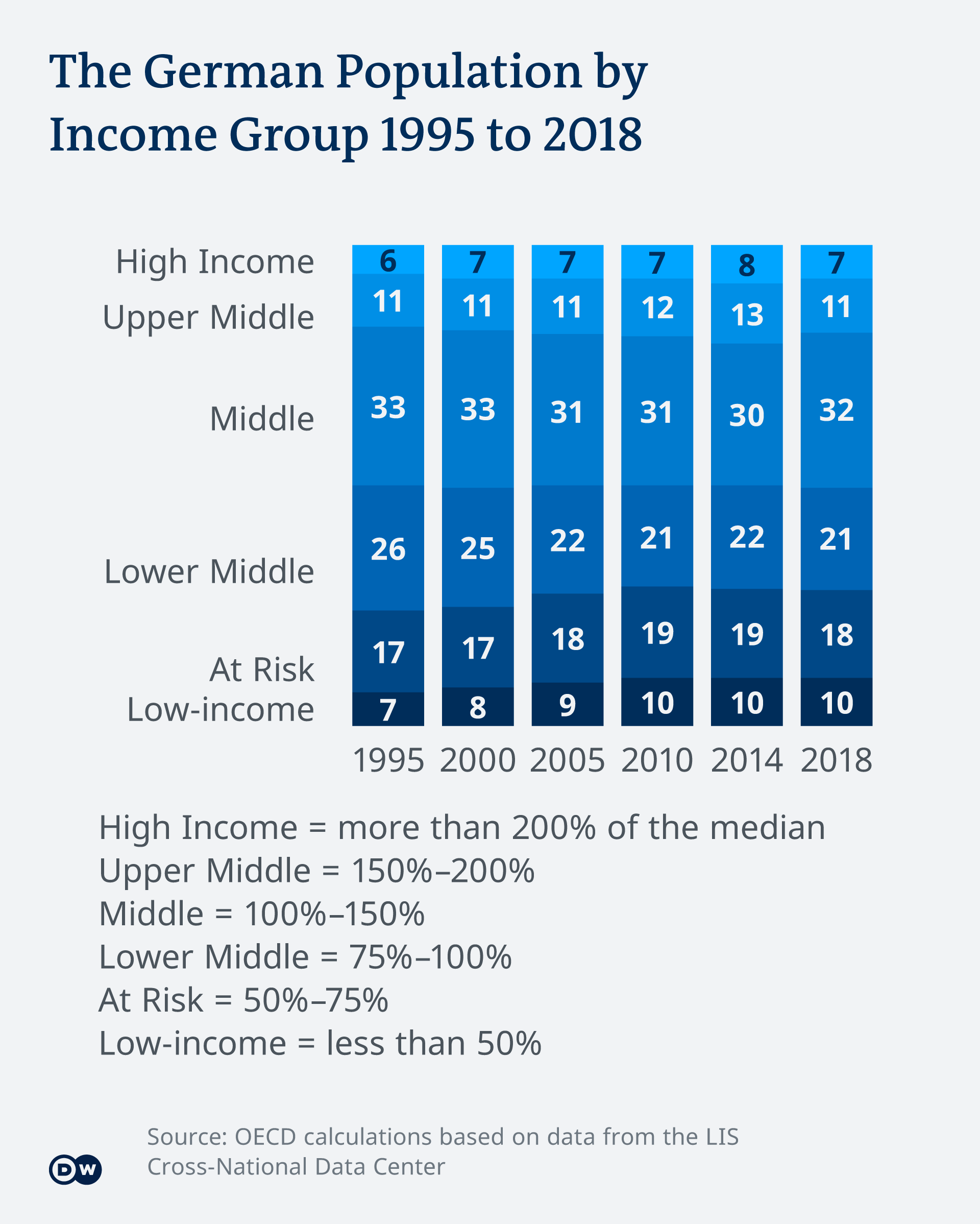In post-war West Germany, a strong middle class was traditionally seen as the anchor of democracy and the cornerstone of the welfare state that defined modern Germany.
But from the mid-nineties, the middle class began to shrink and has since not recovered, according to the latest study by the Bertelsmann foundation. The figures correspond to findings by the Organization for Economic Cooperation and Development (OECD) which shows that from 1995 until 2018 the percentage of Germans in the middle class fell from 70% to 64%.
Membership in the middle class continued to fall until 2015 and has still not fully recovered despite economic growth and falling unemployment rates. During that time the lowest income group – earning less than 50% of the median income – was the group that grew the most, rising from 7% to 10%.
Harder to enter the middle and harder to stay there
“Someone who is not in the middle-class today has a significantly harder time entering it than in the nineties,” says Valentina Sara Consiglio, project manager for the report. “the middle class didn’t recover even though there was economic growth and unemployment fell.”
Consiglio sees the changing job market as one of the factors making it harder to enter and stay in the middle class. Education and specialized degrees have become increasingly important for better-paying jobs. Meanwhile, there are more low-paying jobs that rarely offer opportunities for advancement that allows access to the middle class.
The study suggests that young Germans in their twenties today, have fewer opportunities than their parents: Whereas 71% of baby boomers – born between 1955 and 1964 – entered the middle class when they started working between the ages of 20 and 39, for millennials – born between 1983 and 1996 that figure is only 61%. But part of the cause could be young Germans studying longer and starting full-time employment later.
Consiglio says that decline has made Germans more aware of the fragility of their economic position, regardless of whether or not they have been pushed out of the middle class.

Germany still has a larger middle class measured by percent than the United States, Canada, and the OECD average. But Germany experienced a larger decrease in the middle class over the past two and a half decades than the US and Canada. The OECD average showed moderate growth.
Those developments are worrying according to Thomas Kurer, a political scientist at the University of Zurich because a stable middle class that feels secure in its position supports established democratic institutions and works as a bulwark against anti-establishment populism.
The link with populism
Based on his research, Kurer says that some of those who have fallen out of the middle class or fear they will look for parties outside of the center. “They don’t see the system working for them anymore and so the critical discourse about how mainstream parties have shaped the system is quite appealing,” he says.
He nonetheless finds it important to recognize that though the appeals made by populist parties are often emotional, there are real issues at stake. “It’s an emotional response that is clearly rooted in the economic structure,” he says.
Changes in the economy have created a voting group that the populist far-right Alternative for Germany (AfD) in particular tried to court. “The AfD and other radical right-wing parties appeal to these people with a discourse about turning back the clock to an idealized past rather than a concrete policy.”
Though the political parties are different he also sees a similarity to the US. “Donald Trump very explicitly appealed to such people with his rhetoric about hard-working people who do not receive their piece of the pie. That is very directly addressing these grievances.”
Equality is a priority for the new government
This month Germany will see a new coalition government take office. It will be led by left-of-center Social Democrats, for whom social and economic justice are major priorities.
An increase in the minimum wage, investment in digitization and infrastructure as well as expansion of the professional and vocational training system is hoped to strengthen the middle class and the economic position of the young.
The authors of the Bertelsmann report see the expansion of training opportunities as beneficial because of the potential to increase social mobility.
But they are critical of other measures such as the expansion of “Mini-Jobs,” a name for a type of marginal employment that pays € 450 ($ 509) or less a month that usually has little chance of advancement. Under current plans that threshold would be raised to € 520 ($ 588). “This may just further exacerbate the mini-job and second-earner trap, especially for women, and thus stands in the way of strengthening the middle class in the long term,” according to the authors of the report.
Edited by Rina Goldenberg
While you’re here: Every Tuesday, DW editors round up what is happening in German politics and society. You can sign up here for the weekly email newsletter Berlin Briefing, to stay on top of developments as Germany enters the post-Merkel era.

Corresponsal de Argentina, Encargado de seleccionar las noticias más relevantes de su interés a nuestro sitio web NewsPer.com





